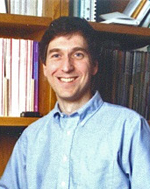Go to
Mark Horowitz
The Future of Electrical Engineering
17 December 2009, EPFL Polydome
 Mark Horowitz
Mark Horowitz
Professor and Director
Computer Systems Laboratory
Electrical Engineering / Computer Science
Stanford University, California, USA
Webpage
Thursday, 17 December 2009 (14h00-14h45), EPFL Polydôme
Electrical Engineering: Where the Physical World meets the Virtual World
One of the joys of being an EE is the ability to change the "principle problems" of the field as technology and societal needs change. Over the past century EE has changed focus multiple times. Stanford's EE was created to help move power from Hoover Dam to the west, then moved to radio and radar. From there it moved to digital communication / information theory and solid state. This lead to the growth in IC research, and the focus changed to explore the explosion in computing systems and the general IT area. With the rapid decrease in cost of electronic systems and the maturing of the underlying technology, we are now in for another transition in the focus of EE. We are moving from the creation of the underlying IT technology, to exploiting it to better connect the rapidly growing world of information (the virtual world), with the physical world. Devices (sensors, actuators, photonics, nano etc) and systems (cameras, medical instruments, environmental sensing, smart power control, etc) at this interface are already critical and will grow in importance in the near future. This research area is broad enough to energize most areas of EE, but will especially push work in modern signal processing / extracting information from data, system design (especially embedded systems), and creating improved sensing technology.
About the speaker:
Mark Horowitz is the Chair of the Electrical Engineering Department and the Yahoo! Founders Professor of the School of Engineering at Stanford University. In addition he is Chief Scientist at Rambus Inc. He is a fellow of IEEE and ACM and is a member of the National Academy of Engineering and the American Academy of Arts and Science. Dr. Horowitz's research interests are quite broad and span using EE and CS analysis methods to problems in molecular biology to creating new design methodologies for analog and digital VLSI circuits.
Download presentation slides (2.5 MB pdf)
Secondary navigation
- EPFL Workshop on Logic Synthesis and Emerging Technologies
- Luca Amaru
- Luca Benini
- Giovanni De Micheli
- Srini Devadas
- Antun Domic
- Rolf Drechsler
- Pierre-Emmanuel Gaillardon
- Jie-Hong Roland Jiang
- Akash Kumar
- Shahar Kvatinsky
- Yusuf Leblebici
- Shin-ichi Minato
- Alan Mishchenko
- Vijaykrishnan Narayanan
- Ian O'Connor
- Andre Inacio Reis
- Martin Roetteler
- Julien Ryckaert
- Mathias Soeken
- Christof Teuscher
- Zhiru Zhang
- Symposium on Emerging Trends in Computing
- Layout synthesis: A golden DA topic
- EPFL Workshop on Logic Synthesis & Verification
- Luca Amaru
- Luca Benini
- Robert Brayton
- Maciej Ciesielski
- Valentina Ciriani
- Jovanka Ciric-Vujkovic
- Jason Cong
- Jordi Cortadella
- Giovanni De Micheli
- Antun Domic
- Rolf Drechsler
- Henri Fraisse
- Paolo Ienne
- Viktor Kuncak
- Enrico Macii
- Igor Markov
- Steven M. Nowick
- Tsutomu Sasao
- Alena Simalatsar
- Leon Stok
- Dirk Stroobandt
- Tiziano Villa
- Symposium on Emerging Trends in Electronics
- Raul Camposano
- Anantha Chandrakasan
- Jo De Boeck
- Gerhard Fettweis
- Steve Furber
- Philippe Magarshack
- Takayasu Sakurai
- Alberto Sangiovanni-Vincentelli
- Ken Shepard
- VENUE
- Panel on Circuits in Emerging Nanotechnologies
- Panel on Emerging Methods of Computing
- Panel on The Role of Universities in the Emerging ICT World
- Panel on Design Challenges Ahead
- Panel on Alternative Use of Silicon
- Nano-Bio Technologies for Lab-on-Chip
- Functionality-Enhanced Devices Workshop
- More Moore: Designing Ultra-Complex System-on-Chips
- Design Technologies for a New Era
- Nanotechnology for Health
- Secure Systems Design
- Surface Treatments and Biochip Sensors
- Security/Privacy of IMDs
- Nanosystem Design and Variability
- Past Events Archive
Links
Watch the presentations on EPFL TV
